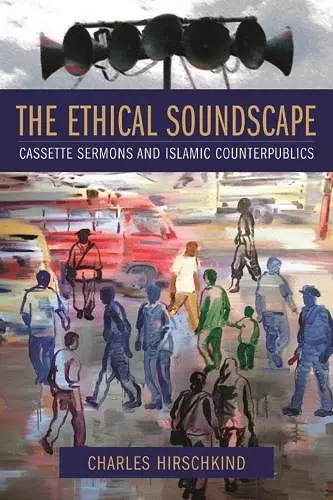The Ethical Soundscape
Cassette Sermons and Islamic Counterpublics
Format:Paperback
Publisher:Columbia University Press
Published:17th Jul '09
Currently unavailable, and unfortunately no date known when it will be back

This insightful study explores the significant role of cassette sermons in shaping modern Islamic ethics and civic engagement, as discussed in The Ethical Soundscape.
In The Ethical Soundscape, Charles Hirschkind presents a compelling examination of the transformative impact of cassette sermons on the political landscape of the Middle East over the past thirty years. This form of Islamic media has become ubiquitous in urban areas, deeply embedded in the daily lives of many individuals. Through his analysis, Hirschkind illustrates how these sermons have recalibrated Islamic ethical traditions to align with contemporary political and technological realities, addressing both the distractions and demands of modern life while encouraging civic engagement and participation.
Hirschkind challenges the prevalent notion that cassette sermons primarily serve as tools for militant indoctrination. Instead, he posits that these tapes function as instruments for ethical self-improvement, guiding listeners in the cultivation of pious sensibilities. By focusing on the neighborhoods of Cairo, he sheds light on the significant role these sermons play in fostering an 'Islamic counterpublic.' This emerging space facilitates rich discussions surrounding ethical discipline, civic duties, and the common good, while also addressing the diverse challenges faced by Muslim communities worldwide.
The Ethical Soundscape is not just an exploration of media practices but also a profound analysis of how these practices contribute to the formation of powerful religious publics. Hirschkind's work highlights the intricate connections between modernity, media, and moral self-fashioning, making it an essential read for anyone interested in the intersections of religion, politics, and culture in the contemporary Islamic world.
A very timely ethnography of Islam in general and Egypt in specific. Anthropology.net The relevance of this analytic project to readers both within and outside the academy cannot be underestimated. -- Ilan Pappe Arab Studies Journal This stimulating book offers a sustained argument and excellent, accessible ethnography for specialists of Islamic politics and media alike. International Journal of Middle East Studies The Ethical Soundscape provides a timely update to this important genre of Muslim expression. -- Flagg Miller Contemporary Islam Well worth the effort. -- Andre Singer Journal of Royal Anthropological Institute This is a substantial anthropological study that delves deep into the meaning and significance of cassette sermons in the context of Islamic revival... This book is a welcome analytical study which should be of profit to many. The Muslim World Book Review
- Winner of Sharon Stephens First Book Award 2007
- Commended for Honorable Mention - Clifford Geertz Prize 2007
ISBN: 9780231138192
Dimensions: unknown
Weight: unknown
288 pages